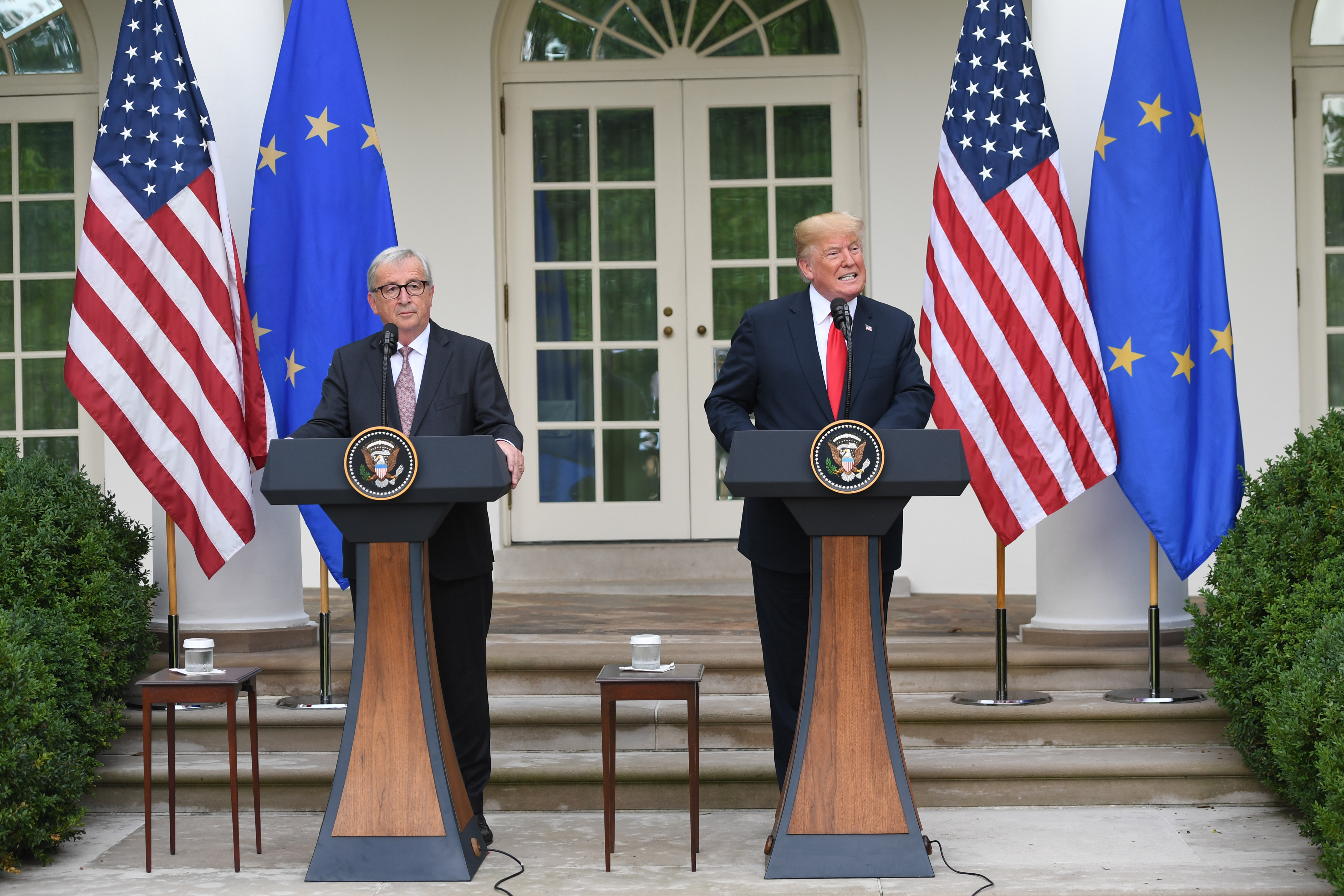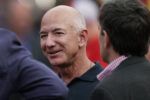US, EU to ‘immediately resolve’ steel, aluminum tariffs: Mnuchin
US President Donald Trump and European Commission chief Jean-Claude Juncker, seen here after White House talks, have moved to defuse trade row
(SAUL LOEB)
Washington (AFP) – The US truce with the European Union will “immediately resolve” the US steel and aluminum tariffs and the EU retaliation at the center of the costly trade row, US Treasury Secretary Steven Mnuchin said Thursday.
But the details of the ceasefire brokered by US President Donald Trump and European Commission chief Jean-Claude Juncker at the White House on Wednesday remain unclear and subject of differing interpretations.
The punishing US metals tariffs angered Washington’s major trading partners including the EU and sparked retaliation against important American exports, spooking global stock markets.
Mnuchin made clear the primary source of the aggravation would be addressed “very quickly.”
“The first issue that we’ll begin negotiating is … the issue on the steel and aluminum tariffs and retaliatory tariffs,” Mnuchin said on CNBC.
Brussels had hit back at the US over the metals tariffs by imposing duties on more than $3 billion of US goods, including blue jeans, bourbon and motorcycles, as well as orange juice, rice and corn.
Mnuchin also confirmed that the US would not impose threatened auto tariffs — which would hurt dominant German carmakers — while negotiations are ongoing. That would head off the threat of another round of EU tariffs on $20 billion in US exports.
“Phase one will be to immediately resolve those issues so there will be no tariffs in either direction,” Mnuchin said.
– ‘Vindication’ for Trump –
The US declared a resounding victory for Trump and his confrontational stance, as Washington appears to have conceded little.
“If we hadn’t had steel and aluminum tariffs, we never would have gotten to the point we are now,” Commerce Secretary Wilbur Ross told reporters. “This is a real vindication of the president’s trade policy.”
The United States and the EU account for about $1 trillion in transatlantic trade, and on Wednesday, the leaders agreed to “launch a new phase” in the relationship and “work together towards zero tariffs, zero non-tariff barriers, and zero subsidies on non-auto industrial goods,” Trump said.
Trump said the EU made a commitment to buy more US soybeans and natural gas, but a European official disputed that characterization.
The joint statement said Brussels and Washington would “work to reduce barriers and increase trade” in a range of products including soybeans, and that the EU “wants to import more liquefied natural gas (LNG) from the United States.”
But an EU official said it will be up to the markets to decide whether to buy more US goods. “We are not going to turn into a Soviet style economy.”
European Central Bank chief Mario Draghi called the tentative truce a “good sign, because in a sense it shows that there is a willingness to discuss trade issues in a multilateral framework again.”
He warned, however, it was too soon to “assess the actual content.”
Germany unsurprisingly hailed the decision, given that their world dominating auto industry was the first in line to be punished by Trump’s protectionist offensive.
But French Finance Minister Bruno Le Maire angrily demanded “clarifications” over the agreed measures.
– NAFTA and autos –
US stocks were mixed in late-morning trading Thursday, with the Dow solidly higher. Agricultural equipment makers Deere & Co. and Agco both advanced.
But even with good news on auto tariffs, car companies General Motors, Ford and Fiat Chrysler all fell. All three companies slashed profit forecasts in part due to higher supply costs following US tariffs on steel and aluminum.
Ross said his department will continue its investigation into possible tariffs on imports of auto and auto parts and submit a report to Trump sometime next month.
However, it “may not be necessary” to impose the tariffs.
Meanwhile, in another sign of movement on trade relations, US Trade Representative Robert Lighthizer said the administration hopes to reach an agreement with Mexico and Canada next month on revising the North American Free Trade Agreement.
That is “not an unreasonable timeframe if everybody wants to get it done,” he told a Senate committee, shortly before he was due to meet with a Mexican trade delegation.
– Watching China currency movements –
Trump also won a commitment from Juncker to work together to reform the World Trade Organization to address some of his complaints about China on theft of US technology, the behavior of state-owned enterprises, and overcapacity in steel.
The Republican president has long complained that the WTO has been unfair to the United States, despite the fact the US has won most of the disputes against China and others.
Mnuchin said there were no new developments on the dispute with China, which has been the target of most of Trump’s trade policies.
“I’ve made perfectly clear that any time China is willing to seriously negotiate — and we’re talking about a commitment to reduce the bilateral trade deficit as well as to deal with technology issues — we’re available any time,” he said.
But he also cautioned that the US is watching China’s currency movements for any sign Beijing is manipulating the yuan.
Disclaimer: This story has not been edited by Siliconeer and is published from a syndicated feed. Siliconeer does not assume any liability for the above story. Validity of the above story is for 7 Days from original date of publishing. Content copyright AFP.


